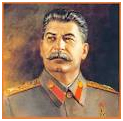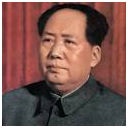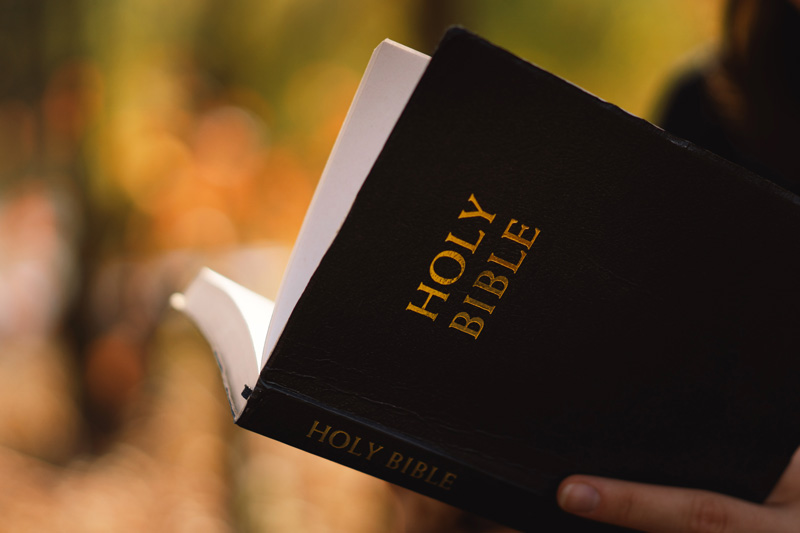
Present Day Persecutions of Christians
 Persecution of believers in Christ still happens today, particularly in countries where the government system and heads of state are hostile to the Christian Faith. In this day and age, persecution is fueled by political ideologies (Socialism-Communism) and by organized state religion such as Islam, Hinduism and Buddhism. For the past century, the number of disciples who died to Communism and Muslim Fundamentalism cannot be numbered. Joseph Stalin did not hesitate to bomb churches and execute clerics, in order to advance his communist agenda and to subjugate the Russian people. Mao Tse Tung as well did not take kindly to Christianity and Christians.
Persecution of believers in Christ still happens today, particularly in countries where the government system and heads of state are hostile to the Christian Faith. In this day and age, persecution is fueled by political ideologies (Socialism-Communism) and by organized state religion such as Islam, Hinduism and Buddhism. For the past century, the number of disciples who died to Communism and Muslim Fundamentalism cannot be numbered. Joseph Stalin did not hesitate to bomb churches and execute clerics, in order to advance his communist agenda and to subjugate the Russian people. Mao Tse Tung as well did not take kindly to Christianity and Christians.
China. Although with fewer atrocities, in today’s China persecution of Christians is still taken place. During the Cultural Revolution, Mao Tse Tung or Mao Zedong was known to jail and execute Christian disciples and church leaders without reprieve (1949-1976). The Communist Party of China (CPC), led by Chairman Mao established the People’s Republic of China in October 1949. Under Communist ideology, religion was discouraged by the state and Christian Missionaries left the country in what was described by Phyllis Thompson of the China Inland Mission as a “reluctant exodus”, leaving the indigenous churches to do their own administration, support and propagation of the faith. The Chinese Protestant church entered the communist era having made significant progress toward self-support and self-government even though Chinese rulers had traditionally sought to regulate organized religion and the CPC efforts to continue the practice.
 From 1966 to 1976 during the Cultural Revolution, the expression of religious life in China was effectively banned. The growth of the Chinese-House-church movement during this period was a result of all Chinese Christian worship being driven underground for fear of persecution. To counter this growing trend of “unregistered meetings”, in 1979 the government officially restored the TSPM (Three Self Patriotic Movement, a protestant organization approved by the Government) and the CPCA (Chinese Patriotic Catholic Association, a Catholic organization authorized by the Government) after thirteen years of non-existence, and in 1980 the CCC (China Christian Council, a protestant institution) was formed.
From 1966 to 1976 during the Cultural Revolution, the expression of religious life in China was effectively banned. The growth of the Chinese-House-church movement during this period was a result of all Chinese Christian worship being driven underground for fear of persecution. To counter this growing trend of “unregistered meetings”, in 1979 the government officially restored the TSPM (Three Self Patriotic Movement, a protestant organization approved by the Government) and the CPCA (Chinese Patriotic Catholic Association, a Catholic organization authorized by the Government) after thirteen years of non-existence, and in 1980 the CCC (China Christian Council, a protestant institution) was formed.
Persecution in China has been sporadic. The most severe times were during the Cultural Revolution. Believers were arrested and imprisoned and sometimes tortured for their faith. Bibles were destroyed, churches and homes were looted, and Christians were subjected to humiliation. Several thousand were imprisoned and killed between 1983 and 1993. In 1992 the government began a campaign to shut down all church unregistered meetings. However, government implementation of restrictions since then has varied widely between regions and in many areas there is greater religious liberty. Independent churches and a variety of evangelical sects have broadened the appeal of Protestantism, especially in rural China. Although outside observers thought the Cultural Revolution had ended Christianity in China, Christianity in all its variety had taken root and has shown to possess the strength and techniques to survive decades of hostility and persecution.
Since 1949, indigenous Chinese Christianity has been growing at a rate unparalleled in history. Nicholas D. Kristof, a columnist of the New York Times wrote on June 25, 2006, “Although China bans foreign missionaries and sometimes harasses and imprisons Christians, especially in rural areas, Christianity is booming”. Most of the growth has taken place in the unofficial Chinese House-Church movement. Christianity also followed Chinese migration. After the year 2000, the center of gravity has shifted from the countryside to the cities, spreading Christianity among intellectuals and associating it with modernity, business and science. In 1800, there were 250,000 baptized Roman Catholics, but no known official figure for Protestant believers out of a population of 362 million Chinese. By 1949, out of an estimated population of 450 million, there were just over 500,000 baptized Protestant Christians.
Anonymous internet columnist Spengler speculated in 2007 that Christianity could “become a Sino-centric religion two generations from now”. The current number of Christians in China is disputed. The most recent official census enumerated 4 million RomanCatholics and 10 million Protestants. However, independent estimates have ranged from 40 million to 130 million Christians. According to a survey done by China Partner and East China Normal University in Shanghai, there are now 39 to 41 million Protestant Christians in China. These include Christians in registered and unregistered churches. The survey was done with 7,400 individuals in 2007-08 by China Partner in all 31 provinces, municipalities and autonomous regions. Another survey done with 4,500 individuals by East China Normal University in Shanghai reveals up to 40 million. Other studies have suggested that there are roughly 54 million Christians in China, of which 39 million are Protestants and 14 million are Roman Catholics; these are seen as the most common and reliable figures. Today, the Chinese language typically divides Christians into two groups, members of Jidu jiao (literally, Christianity), Protestantism, and members of Tianzhu jiao (literally “Lord of Heaven” religion), Catholicism.
Islamic Saudi Arabia and communist North Korea
Today, Islamic Saudi Arabia and communist North Korea are notoriously the world’s worst persecutors of Christians. For 2008, a church persecution advocacy group predicted that those two countries would remain the worst persecutors of the Christian Faith. The Christian Post on its January 8th issue reported the following for the year 2007:
- China Arrests 270 Underground Protestant Pastors
- Muslim Rioters Destroy Christian Stores in Egypt
- Lonely Christmas for Christians in North Korea
- Christmas Riots Continue in Orissa (province of India)
- Seven Churches Bombed in Iraq
 In both countries, Saudi Arabia and North Korea, Christianity is illegal and practice of the religion is strictly forbidden and results in severe punishments. “In 2008, millions of Christians will face persecution,” said Andy Dipper, CEO of U.K.-based Release International, which released the survey of Christian persecution in the New Year.According to Release(Release International is an organization which works to support persecuted Christians) most of the persecution of Christians in 2008 will take place in four “zones” – Islam, Communism, Hinduism and Buddhism. Harassment can originate from the government or its agents – such as the secret police, military and judiciary – or from non-governmental movements, such as militant Islamic groups.
In both countries, Saudi Arabia and North Korea, Christianity is illegal and practice of the religion is strictly forbidden and results in severe punishments. “In 2008, millions of Christians will face persecution,” said Andy Dipper, CEO of U.K.-based Release International, which released the survey of Christian persecution in the New Year.According to Release(Release International is an organization which works to support persecuted Christians) most of the persecution of Christians in 2008 will take place in four “zones” – Islam, Communism, Hinduism and Buddhism. Harassment can originate from the government or its agents – such as the secret police, military and judiciary – or from non-governmental movements, such as militant Islamic groups.
In the Islam zone, Saudi Arabia is an Islamic state that practices Wahhabism and restricts all other religions, including the possession of religious items such as Bibles, Crucifixes, and Stars of David, Christians are arrested and lashed in public for practicing their faith openly. Strict Sharia is enforced. Muslims are forbidden to convert to another religion. If one does so and does not recant, he may be executed. Saudi Arabia stands out not only for its extremely harsh laws against all religions other than the Wahhabi branch of Islam, but also because it spends millions each year disseminating Islamic teachings around the world. These religious literatures have been accused by the U.S. Commission on International Religious Freedom (USCIRF) of spreading intolerance among young Muslims by teaching them to hate “infidels,” or non-believers. Besides Saudi Arabia, moderate Muslim countries are also guilty of not providing enough protection to their citizens who are considered Christian minorities.
In moderate Islamic countries such as Egypt and Turkey, Christians still suffer from kidnapping, forced conversion to Islam, imprisonment, destruction of churches, execution, rape of Christian girls, torture, and discrimination in education, employment, housing and in the legal system. “Islamist militants often view Christians and non-Muslims as infidels, who must be converted, by force if necessary, or be killed or driven out of Islamic lands” * (source: Release International). “They believe it is their religious duty to impose Islamic Sharia law throughout their nation”.
In the Communist zone: Meanwhile, in countries with communist regimes such as China, Cuba, and North Korea, believers face a more systemic form of persecution that involves house arrest, interrogation, fines, and imprisonment. Nevertheless, North Korea remains arguably the world’s worst persecutor of Christians. Believers are imprisoned in special labor camps, brutally tortured and even publicly executed. ’’Pressures include an absolute ban on owning a Bible, assembling to pray or to read the Scriptures, and on evangelism – even of one’s own children. Being discovered as a member of the underground church inside North Korea can result in one’s entire family being sent to a prison camp. Even torture and summary execution may take place in extreme cases”. (Source: Tim Peters of Helping Hands Korea; Helping Hands, is a partner of Release International and helps refugees escape North Korea).
In the Hindu zone, Christians face extremists who have lately increased attacks against not only believers in Jesus but also against Muslims. This Hindu nationalism in India is linked to one of the country’s largest political parties, the Bharatiya Janata Party, which is associated with a number of militant Hindu groups.
In the Buddhist zone; believers are also persecuted in Buddhist Burma, and Sri Lanka where religious militants regard Christianity as a threat to national identity and unity.
For many disciples today “Persecution is part of their Christian life” and remains prevalent to this day in countries such as India, Iran, Pakistan, Iraq, Sudan, Afghanistan, Indonesian, Saudi Arabia, Russia, Ireland, North Korea, Nigeria, Cuba, etc. Over the last two thousand years, history has documented over 70 million Christian martyrs with 45 million or 70% killed in the past century alone.




